List of the oldest courthouses in the United States
Below is a list of the oldest extant courthouses in the United States.
Active
| Courthouse | Photo | Location | Built | Notes |
|---|---|---|---|---|
| King William County Courthouse |  | Virginia | 1725 | Built in 1725, this is the oldest courthouse still in continuous use in the United States.[1] It is also the oldest public building still in use in Virginia. The courthouse is constructed of brick laid in Flemish bond. In 1840 the courthouse was enlarged and a brick wall was erected to enclose the court green and to keep livestock and poultry away from the buildings. A new and modern county courthouse was built upon the courthouse grounds in 2004; however, the 1725 courthouse remains in use for some of the county's judicial functions and proceedings.[2] |
| Old Salem County Courthouse | New Jersey | 1735 | Built in 1735, this building is the oldest active courthouse in New Jersey and is the second oldest courthouse still in continuous use in the United States.[3] It was built using locally manufactured bricks and was enlarged in 1817 and 1908. It served as the courthouse for Salem County until 1969 when a larger and more modern facility was built for the county. Today it serves as the courthouse for the Salem City Municipal Court.[4][5]
In 1774, the courthouse was the site of a county petition to King George III to address various colonial grievances and for authorizing county relief to the citizens of Boston to assist them from the King's sanctions from the Boston Tea Party incident. Judge William Hancock of the King's Court of Common Pleas presided at the courthouse.[6] He was later unintentionally killed by British soldiers in the American Revolution during the massacre of Hancock House (New Jersey) committed by the British against local Revolutionary militia during the Salem Raid in 1778. The courthouse was afterwards the scene of the "treason trials" of 1778, wherein suspected Loyalists were put on trial for having allegedly aided the British during the Salem Raid.[3] Four men were convicted and sentenced to death for treason; however, they were pardoned by Governor William Livingston and exiled from New Jersey. The courthouse is also the site of the legend of Colonel Robert Gibbon Johnson proving the edibility of the tomato. Before 1820, Americans often assumed tomatoes were poisonous. In 1820, Colonel Johnson, according to legend, stood upon the courthouse steps and ate tomatoes in front of a large amazed crowd assembled to watch him do so.[7] | |
| Hanover County Courthouse |  | Virginia | 1737–1742 | This courthouse is often cited as having been built in 1735, although it is dated by the state register as having been built between 1737 and 1742.[8] It is the third oldest courthouse still in use in the United States.
This courthouse was the local county seat of lawyer and patriot Patrick Henry.[9] It was in this courthouse that Patrick Henry argued the case of the Parson's Cause in 1763.[10] A case involving King George III's requirement that Virginia residents pay taxes to support the local Anglican Church ministry over the objection of Virginia residents and the Virginia colonial legislature, Henry accused the King of tyranny in overturning colonial law without regard to the wishes of his subjects. The case and Henry's arguments are now regarded by many historians as one of the prelude events leading to the American Revolution. In 1774, the courthouse was the site of local preparation for the first assembly of the Virginia Convention and it considered grievances against British rule and the "Hanover Resolves" adopted at the meeting also supported the Boston Tea Party.[8] |
| Charles City County Courthouse | .jpg) | Virginia | 1730s–1750s | This courthouse actually may be the second oldest courthouse but its actual construction date is no longer known. Some estimates believe it was built as early as 1730 or the early 1730s but others date it more towards the mid-1750s. Men like Benjamin Harrison V, a signer of the Declaration of Independence, and John Tyler, the 10th President of the United States, argued here. The courthouse was the scene of considerable fighting during the Civil War and many of its colonial records were lost, including the date of construction.[11][12] |
| Richmond County Courthouse | .jpg) | Virginia | 1748 | Built in 1748, this courthouse, a fine example of early classical Palladian style architecture, remains the county courthouse to this date.[13][14][15] Richmond County, Virginia in the Northern Neck of Virginia is not to be confused with Richmond, Virginia. |
| King and Queen County Courthouse | 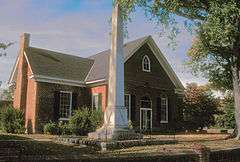 | Virginia | ca. 1750 | The original portion of this structure was built around 1750. It has been rebuilt and remodelled extensively due to fires, including those set by Union forces in retaliation for a murder of a Union general by local Home Guard militia during the Civil War, and also expanded to accommodate growth in local population. A new facility was constructed in 1997 to handle the majority of the county judicial proceedings but the old courthouse remains active for handling court proceedings.[16][17] |
| Charleston County Courthouse | .jpg) | South Carolina | 1753 | Built in 1753, it served as the provincial capitol for the colony of South Carolina with colonial court proceedings being held on the first floor. It was gutted by fire during the Constitutional Ratification Convention of 1788, leaving only the foundation, walls and doorways. It was rebuilt within the remaining structure in 1792 and, with additions and a recent restoration towards its colonial past, has served as the county courthouse to this time.[18] Among the trials held here were those of captured soldiers of the 54th Massachusetts Volunteer Infantry, the famed black regiment of the Union Army in the Civil War, who were tried and acquitted of slave insurrection in November 1863 following the Union assault of Fort Wagner.[19] |
| Sussex County Courthouse |  | New Jersey | 1765 | Built in 1765, the courthouse was the site of a daring raid during the American Revolution by one of the Loyalists' best operatives, Lieutenant James Moody.[20] In 1780, Moody led several men to free eight Loyalist prisoners held in the Sussex County Courthouse. Moody freed the men and fled with them. Despite a pursuit lasting several days, Revolutionary forces failed to capture them. The court was gutted by fire in 1847 and rebuilt within the original walls and structure. It continues to handle judicial proceedings in conjunction with a newer facility.[20] |
| Chowan County Courthouse | .jpg) | North Carolina | 1767 | Built in 1767, it served as a local Whig center during the Revolutionary War.[21] It is the oldest public building in North Carolina and one of the best preserved and majestic colonial courthouses of Georgian architecture in the nation.[22] It served as a banquet hall when President James Monroe visited Edenton in 1819.[22][23] Currently is serves for conducting county judicial proceedings in conjunction with a newer facility and also for handling other local government activities. |
| Fulton County Courthouse |  | New York | 1772 | Built in 1772 in Johnstown, it was requested and partially funded by Sir William Johnson and the first judges presiding at the courthouse included his son Sir John Johnson and John Butler, both of whom later operated Loyalist brigades during the American Revolution such as the King's Royal Regiment of New York and Butler's Rangers.[24] The building is the oldest courthouse in New York and it still regularly functions as the county courthouse to this day.[24] At the time it was built, Johnstown was in Montgomery County. The courthouse name was changed when Fulton County was created in 1838. |
| New London County Courthouse |  | Connecticut | 1784 | Built in 1784, it is the oldest courthouse in Connecticut. American Patriot Patrick Henry argued cases in the courthouse and other historical notables such as Daniel Webster, Gilbert du Motier, marquis de La Fayette and Horace Greeley spoke here.[25] |
| Shenandoah County Courthouse |  | Virginia | 1795 | Built in 1795, this building continues to operate as the county courthouse to this day.[26] |
| Old Burlington County Courthouse | New Jersey | 1796 | Built in 1796, its architect, Samuel Lewis, designed the building as a virtual identical twin of Congress Hall and Old City Hall, the buildings flanking Independence Hall in Philadelphia, of which he also built. The courthouse bell, removed and installed from an earlier courthouse, rang for independence in 1776. The courthouse continues to handle judicial proceedings.[27] | |
| Queen Anne's County Courthouse |  | Maryland | 1796 | Built in 1796, it is the oldest active courthouse in Maryland.[28] The earlier county court, built in 1708, still stands and is a museum. |
Former courthouses
The following other old courthouses still standing today exist as museums, for other government functions, or are now privately owned facilities.
| Courthouse | Photo | Location | Built | Notes |
|---|---|---|---|---|
| Former Queen Anne County Courthouse | Maryland | 1708 | Built in 1708, it is likely the oldest courthouse still standing in the United States. Today the property is open as a museum.[29] | |
| Old Chester Courthouse | | Pennsylvania | 1724 | This is the oldest public building in continuous use in the United States. It is a handsome structure and a well preserved and valuable example of a colonial period stone courthouse. From 1724 until 1786, it served as the courthouse for Chester County, Pennsylvania and, after a county division, the courthouse for Delaware County, Pennsylvania until the county seat was relocated in 1851. Thereafter is served as the town hall for the City of Chester, Pennsylvania until the 1960s. Today it is used for miscellaneous city, county and civic functions. Colonists assembled here for the Havana raid during the War of Jenkins' Ear. The courthouse was a scene of the reading of the Declaration of Independence following its announcement in Philadelphia and the court's bell, which is still in its cupola, rang to announce independence. Several prominent legal and political figures argued at the court, including Thomas McKean, signer of the American Declaration of Independence. Gilbert du Motier, marquis de La Fayette was hosted and honored here. It was the site of the tragedy story of the trial and hanging of Elizabeth (Harriot) Wilson and the resulting story of the Pennsylvania Hermit, William (Amos) Wilson.[30] |
| Old Essex County Courthouse |  | Virginia | 1729 | Converted and expanded into a church in the 19th century. |
| New Castle County Court House |  | Delaware | 1730 | This building was built over the remains of Delaware's first courthouse (1689) that was burnt by an arsonist and of which the foundation is still visible. It served as the county courthouse until 1881 when the county seat was moved to Wilmington, Delaware. The building was the center of the twelve mile circle that forms part of the boundary between Delaware and Pennsylvania. It was originally the colonial and state capitol in addition to a courthouse, and it was here that the Assembly voted to separate from England and drafted the first Delaware Constitution. It is now part of the First State National Historical Park.[31] |
| Old Northampton County Courthouse | | Virginia | 1731 |
The first judges held court on the lower Eastern Shore of Virginia starting in 1632 by meeting in private homes, ordinaries and taverns. In 1677 the court was moved to an area called “The Hornes”, later to be called Peachburg Town, and then Eastville. The site has served as the seat of Northampton County government since that time. Circa 1731, the old Northampton County Courthouse, laid in Flemish bond brickwork, was preceded by at least two wooden structures. The 1731 courthouse became too small and use was discontinued in 1795. It was leased as a store with the condition that the structure be re-roofed and maintained. In 1913 the County bought back the lease and prepared to demolish the structure. A campaign by local residents to save the structure began and the building was moved 30 feet to its current location and preserved for visitors today. The site also holds the old Clerk’s Office (ca. 1725-1750), old Debtor’s Prison (ca. 1814), a former courthouse (1899), a former jail (1914), and Lawyer’s Row. One of the most complete historic court greens in the United States the Eastville Court Green is listed as a Historic District on both the Virginia Landmarks Register and the National Register of Historic Places. A museum curated by the Northampton Historic Preservation Society is housed in the former 1899 courthouse. |
| Cahokia Courthouse | | Illinois | ca. 1740 | This structure was erected as a private residence circa 1740 when the area was French territory. In 1793, the residence was purchased by the federal government to function as the court for the United States Northwest Territory. It also hosted territorial government activities. It is Illinois's oldest courthouse and the only surviving territorial court. The courthouse is architecturally significant as an example of the French Colonial vertical log poteaux-sur-solle (“post-on-sill”) construction technique.[32] |
| Old Middlesex County Courthouse | Virginia | 1745 | ||
| Plymouth Courthouse |  | Massachusetts | 1749 | Built of wood, it served as a courthouse until 1820. It also served local municipal uses from 1749 until the 1950s. It was opened as a museum in 1970.[33] |
| Old Isle of Wight Courthouse | | Virginia | 1750s | Located in Smithfield, Virginia. |
| Old Lincoln County Courthouse | Maine | 1761 | Judges and lawyers who served or appeared here include Robert Treat Paine, Benedict Arnold, William Cushing, and James Sullivan.[34] Today it is a museum. | |
| Old Gloucester County Courthouse | .jpg) | Virginia | 1766 | |
| Perth Amboy City Hall | New Jersey | 1767 | This building is now the oldest City Hall in continuous use in the United States. It originally held court functions as well as city administration functions.[35][36] | |
| Williamsburg-James City County Courthouse |  | Virginia | 1771 | [16][37] |
| Olde Colonial Courthouse | Massachusetts | 1772 | Built of wood, court proceedings of the King's Court were interrupted in 1774 by James Otis, Samuel Adams and 1,500 other protestors opposed to the King's Bill of Attainder that denied the right of colonists to a jury trial.[38] As a result, the King's judge decided to cease holding cases. It served as a state courthouse until 1838.[38] This courthouse in now a museum and hosts the "Tales of Cape Cod" that aids the local tourist industry.[39] | |
| Old Grafton County Courthouse | New Hampshire | 1774 | Built in 1774, this building was the site of Daniel Webster's first criminal case in 1805 and served as a courthouse until 1823. It thereafter served as a public library for many years and is now maintained as a museum.[40] | |
| Old West Liberty Courthouse | West Virginia | 1778-79 | ||
| Bedford Courthouse | New York | 1787 | Today this is open as a museum.[41] | |
| Hardy County Courthouse | West Virginia | 1792 | Built in 1792, it served as a courthouse until 1860 and is now a luxury apartment building.[42] | |
| Old Hunterdon County Courthouse | New Jersey | 1793 | Struck by fire likely caused by arson in 1828, it was heavily rebuilt using and incorporating the original walls. The courthouse was the scene of the trial of Bruno Hauptmann, the man convicted in the Lindbergh kidnapping case in what became coined as "The Crime of the Century" and "The Trial of the Century" in popular media and folklore at the time. Today it is open for tours including regular re-enactments of the Hauptmann trial and for ceremonial purposes.[43] | |
| Old Carteret County Courthouse | North Carolina | 1796 | This is the oldest surviving wooden courthouse in North Carolina. Today it serves as a museum and hosts an interactive dramatization program that allows school children to conduct mock trials and reenactments for famous trials for educational purposes.[44] | |
| Old Greene County Courthouse | Pennsylvania | 1796 | This structure, now a museum, shows a good example of an early wooden log cabin courthouse.[45] | |
| Old Fairfax County Courthouse | 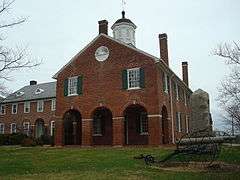 | Virginia | 1799 | [46] |
| Old Russell County Courthouse | 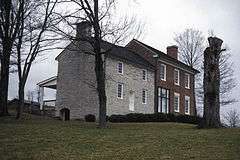 | Virginia | 1799 | [47] |
| The Cabildo |  | Louisiana | 1799 | The Cabildo in New Orleans was built between 1795-99 as the home of the Spanish municipal government after the original Cabildo was destroyed in the Great New Orleans Fire. The building took its name from the colonial governing body, the "Illustrious Cabildo," or city council. The Cabildo was the site of the Louisiana Purchase transfer ceremonies in 1803, and continued to be used by the New Orleans city council until the mid-1850s. The building's main hall, the Sala Capitular ("Capitol Room"), was originally utilized as a courtroom. The Spanish used the courtroom from 1799-1803, and from 1803-1812, it was used by the Louisiana territorial superior court. After the American Civil War, it was the home of the Louisiana Supreme Court from 1868-1910. The Sala Capitular was the site of several landmark court cases, including Plessy v. Ferguson. In 1911 the Cabildo became the home of the Louisiana State Museum.[48] |
By state
Active
| State | Courthouse | Photo | Built | Notes |
|---|---|---|---|---|
| Alabama | Talladega County Courthouse | | 1836 | This building, although severely damaged by a tornado on May 11, 1912 and gutted by a fire on March 13, 1925, is the oldest courthouse in continuous use in Alabama. It was significantly altered from its original form when rebuilt after the fire.[49] It is a contributing building to the Talladega Courthouse Square Historic District, added to the National Register of Historic Places on October 18, 1972.[50] The next oldest courthouse in continuous use, architecturally unaltered, is the St. Clair County Courthouse in Ashville, completed in 1844. |
| Alaska | Homer Courthouse | A new facility is being planned for 2009.[51] | ||
| Arizona | Pinal County Courthouse | 1891 | [52] | |
| Arkansas | White County Courthouse | 1871 | Built in 1871 and remodeled in 1912, it is the oldest courthouse in Arkansas still being used for the original purpose. The first story is constructed of cut stone, while brick is used on the second story.[53] | |
| California | Mariposa County Courthouse | 1854 | Built in 1854, this fine early Greek Revival building is the oldest courthouse in continuous use west of the Rockies.[54] | |
| Colorado | Hinsdale County Courthouse | 1877 | [55] | |
| Connecticut | New London County Courthouse |  | 1784 | [56] |
| Delaware | Sussex County Courthouse | 1839 | [57] | |
| Florida | Osceola County Courthouse |  | 1890 | [58] |
| Georgia | Columbia County Courthouse | 1825 | Built in 1824-25, it was declared the state's oldest and still active courthouse after a county rivalry with Fayette County for the distinctions.[59] | |
| Hawaii | ||||
| Idaho | ||||
| Illinois | Putnam County Courthouse | 1839 | [60] | |
| Indiana | Ohio County Courthouse | 1844 | [61] | |
| Iowa | Van Buren County Courthouse | 1843 | It was built in 1843 and is Iowa's oldest courthouse in continuous operation and the oldest in continuous use west of the Mississippi.[62][63] | |
| Kansas | Chase County Courthouse | | 1873 | It was built in 1873 with native Cottonwood Limestone and is the oldest operating courthouse in Kansas.[64] |
| Kentucky | Washington County Courthouse | 1816 | [65] | |
| Louisiana | East Feliciana Parish Courthouse |  | 1840 | [66] |
| Maine | Lincoln County Courthouse | 1824 | Built in 1824 to replace the Old Lincoln County Courthouse, it is the oldest courthouse still in use in the state.[67] | |
| Maryland | Queen Anne's County Courthouse | 1796 | [28] | |
| Massachusetts | Newburyport Superior Courthouse | 1805 | [68] | |
| Michigan | Lapeer County Courthouse | 1846 | [69] | |
| Minnesota | Dodge County Courthouse | 1871 | [70] | |
| Mississippi | Amite County Courthouse | 1840 | [71] | |
| Missouri | Lafayette County Courthouse |  | 1847 | [72] |
| Montana | Madison County Courthouse | 1876 | [73] | |
| Nebraska | Otoe County Courthouse | 1865 | The brick Italianate courthouse, the oldest public building in the state, was completed in 1865, two years before Nebraska became a state.[74] | |
| Nevada | Storey County Courthouse | 1877 | [75] | |
| New Hampshire | ||||
| New Jersey | Old Salem County Courthouse | 1735 | Built in 1735, this building is the oldest active courthouse in New Jersey and is the second oldest courthouse still in continuous use in the United States.[3] | |
| New Mexico | Union County Courthouse | 1909 | [76] | |
| New York | Fulton County Courthouse | 1772 | [24] | |
| North Carolina | Chowan County Courthouse | .jpg) | 1767 | Built in 1767, it is the oldest public building in North Carolina and one of the best preserved and majestic colonial courthouses of Georgian architecture in the nation.[22] |
| North Dakota | ||||
| Ohio | Perry County Courthouse |  | 1829 | Built in 1829, this is a former county courthouse that is still in used today as a town court.[77] |
| Oklahoma | Kiowa County Courthouse | 1902 | [78] | |
| Oregon | Benton County Courthouse | 1889 | [79] | |
| Pennsylvania | Lehigh County Courthouse | 1817 | Built in 1817, this courthouse is the oldest active courthouse but it was altered in 1841 to show a new style.[80] | |
| Rhode Island | Kent County Courthouse | 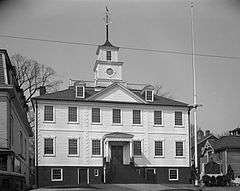 | 1803 | Currently, serves as a town hall and meeting place for the probate court |
| South Carolina | Charleston County Courthouse | .jpg) | 1753 | [18] |
| South Dakota | Huchinson County Courthouse | 1881 | [81] | |
| Tennessee | Dickson County Courthouse | 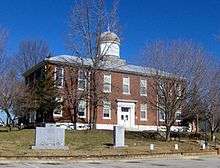 | 1836 | Built in 1833, following the Tornado of 1830 that destroyed all but one building on the now Historic Court Square. |
| Texas | Cass County Courthouse | 1861 | [82] | |
| Utah | Brigham City Courthouse | 1857 | The original adobe structure, built in 1857, still forms the core of the present courthouse, making it the oldest extant and active courthouse in Utah.[83] | |
| Vermont | Windham County Courthouse | 1825 | [84] | |
| Virginia | King William County Courthouse |  | 1725 | Built in 1725, this is the oldest courthouse still in continuous use in the United States.[1] It is also the oldest public building still in use in Virginia. |
| Washington | Columbia County Courthouse | 1887 | [85] | |
| Wisconsin | Iowa County Courthouse | 1859 | [86] | |
| Wyoming | Uinta County Courthouse | 1873 | Built in 1873, it was drastically modified in 1904 but is nevertheless the state's oldest courthouse.[87] |
Former
| State | Courthouse | Photo | Built | Notes |
|---|---|---|---|---|
| Alabama | Old Morgan County Courthouse | _Court_House%2C_Somerville_(Morgan_County%2C_Alabama).jpg) | 1837 | This Late Federal style building is the oldest extant courthouse in Alabama.[88] It was added to the National Register of Historic Places on March 24, 1972.[50] |
| Delaware | New Castle County Courthouse | 1731 | See earlier section above for more details. | |
| Florida | Old Manatee County Courthouse | 1860 | Built in 1859-1860, it is the oldest surviving courthouse and is now part of the Manatee Village Historical Park.[89] | |
| Hawaii | Old Lahaina Courthouse | | 1859 | A bad storm in 1858 destroyed more than 20 houses in Lahaina, including Hale Piula (the courthouse) that was built in the 1830s as a palace for King Kamehameha III but was never completed. A year later a new courthouse was built using stones from the old one and for a year it served as the center of justice for Maui County.[90] |
| Idaho | Pierce Courthouse |  | 1862 | Built in 1862, the structure was used until 1884. It was later sold for a mere $50.[91] |
| Illinois | Cahokia Courthouse | | 1740s | |
| Kentucky | Old Green County Courthouse |  | 1803 | Built of stone in 1803, it is the oldest stone courthouse west of the Allegheny Mountains.[92] |
| Louisiana | The Cabildo |  | 1799 | The Cabildo in New Orleans was built between 1795-99 as the home of the Spanish municipal government after the original Cabildo was destroyed in the Great New Orleans Fire. The building took its name from the colonial governing body, the "Illustrious Cabildo," or city council. The Cabildo was the site of the Louisiana Purchase transfer ceremonies in 1803, and continued to be used by the New Orleans city council until the mid-1850s. The building's main hall, the Sala Capitular ("Capitol Room"), was originally utilized as a courtroom. The Spanish used the courtroom from 1799-1803, and from 1803-1812, it was used by the Louisiana territorial superior court. After the American Civil War, it was the home of the Louisiana Supreme Court from 1868-1910. The Sala Capitular was the site of several landmark court cases, including Plessy v. Ferguson. In 1911 the Cabildo became the home of the Louisiana State Museum. |
| Maine | Old Lincoln County Courthouse | 1761 | Built in 1761, judges and lawyers who served or appeared here include Robert Treat Paine, Benedict Arnold, William Cushing, and James Sullivan.[34] Today it is a museum. | |
| Maryland | Former Queen Anne County Courthouse | 1708 | Built in 1708, it is likely the oldest courthouse still standing in the United States. Today the property is open as a museum.[28] | |
| Massachusetts | Plymouth Courthouse |  | 1749 | Built in 1749 of wood, it served as a courthouse until 1820. It also served local municipal uses from 1749 until the 1950s. It was opened as a museum in 1970.[33] |
| Michigan | 1839 Courthouse Museum | 1839 | [93] | |
| Minnesota | Washington County Courthouse | | 1870 | Built in 1870, it is still used today for other civil functions.[94] |
| Nevada | Genoa Courthouse | 1865 | This 1865 building was first the government seat, then a school, and now a museum.[95] | |
| New Hampshire | Old Grafton County Courthouse | 1774 | Built in 1774, this building was the site of Daniel Webster's first criminal case in 1805 and served as a courthouse until 1823. It thereafter served as a public library for many years and is now maintained as a museum.[96] | |
| North Dakota | Stutsman County Courthouse | 1883 | The structure, built in 1883, is the oldest remaining courthouse in the state.[97] | |
| Ohio | Chester Courthouse |  | 1823 | Built in 1823, this building is Ohio's oldest standing courthouse and is today a museum. |
| Oregon | Pioneer Courthouse | | 1875 | Built in 1875, this is the oldest extant federal building in the Pacific Northwest.[98] |
| Pennsylvania | Old Chester Courthouse | | 1724 | Built in 1724, this is the oldest public building in continuous use in the United States; it still serves other public functions to this day.[99] See earlier sections for greater detail on this building. |
| Rhode Island | White Horse Tavern | 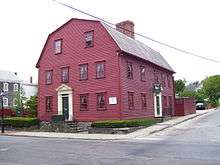 | 1673 | Constructed before 1673 in Newport, it is one of the oldest active tavern buildings in the United States and once served for large meetings including use as a Rhode Island General Assembly meeting place, a court house, and a city hall. As of 2008, it still remains a popular drinking and dining location. |
| Texas | "Old Cora" Courthouse | 1856 | The 1856 split-log, one-roomed courthouse served as a post office as well as district court.[100] | |
| Washington | Territorial Courthouse | 1858 | Built in 1858, it is Washington's oldest brick building. It has served many purposes over time including as a courthouse.[101] | |
| West Virginia | West Liberty Courthouse | 1778 | Built in 1778-79. Old West Liberty Courthouse (in the town previously called "Black's Cabin," in Ohio County, then Virginia). Oldest Courthouse constructed west of the Allegheny Mountains. Log structure used as a Courthouse until 1798, when Wheeling, Virginia, was selected as the site of the county Courthouse. The building then was converted into a grist mill, and later used as a residence. Currently uninhabited and is undergoing restoration. |
See also
References
- 1 2 Welcome to King William County
- ↑ King William County History
- 1 2 3 Welcome to Salem, New Jersey
- ↑ Salem City Municipal Court Salem NJ Salem County
- ↑ Municipal Court Addresses
- ↑ Cup O'Jersey South - South Jersey History: William Hancock House, Hancocks Bridge, New Jersey
- ↑ "The Story of Robert Gibbon Johnson and the Tomato", The history Highway of the Salem County Historical Society. May 2005. Accessed August 13, 207.
- 1 2 Discover Richmond
- ↑ Patrick Henry
- ↑ Patrick Henry
- ↑ http://www.dhr.virginia.gov/registers/Counties/CharlesCity/018-0005_Charles_City_County_Courthouse_1969_Final_Nomination.pdf
- ↑ http://www.charlescity.org/1county.php
- ↑ https://books.google.com/books?id=2UDeCueUUJQC&pg=PA251&lpg=PA251&dq=richmond+courthouse+and+1748+and+virginia&source=web&ots=lzy2PANcX1&sig=c-i6qBOuzD16vfEvCVx65wrOmGI
- ↑ Richmond County and Northern Neck - http-equiv=refresh content=0; URL=http://www.inrich.com/cva/ric/entertainment.html - inRich.com
- ↑ History
- 1 2 https://books.google.com/books?id=CEpT8LO97-YC&pg=PA23&lpg=PA23&dq=virginia+and+gloucester+and+courthouse+and+1766&source=web&ots=El8vmmD4m-&sig=XeYa8fQ_dzEeeJh5qo0aZ4PkfcA#PPA19,M1
- ↑ http://www.dhr.virginia.gov/registers/Counties/KingandQueen/49-5001_KingandQueenCo_KingandQueenCourthouseGreenHD_Final.pdf
- 1 2 Charleston County Courthouse
- ↑ Civil War Sites and Attractions, Charleston, SC
- 1 2 Newton, NJ - The Sussex Court House
- ↑ Chowan County Courthouse, Marker A-11 - North Carolina Historical Markers on Waymarking.com
- 1 2 3 Edenton, North Carolina - ICW-NET NE NC Communities: Internet Coastal Waterways Network Intracoastal Waterway , aka The Ditch
- ↑ NC Museum of History: History Highlights - Eighteenth-Century North Carolina
- 1 2 3 Fulton County Court House
- ↑ New London County Courthouse
- ↑ Woodstock
- ↑ Mount Holly Township Historic Information
- 1 2 3 The Queen Anne's County Court House
- ↑ Queenstown Courthouse - Queenstown (HistoricQAC.org)
- ↑ 1724 Court House, Chester, PA
- ↑ See the New Castle Court House Museum
- ↑ Cahokia Courthouse - Welcome
- 1 2 Plymouth, MA - 1749 Court House
- 1 2 The 1761 Pownalborough Courthouse
- ↑ "Mr. Bloomberg, Perth Amboy Begs to Differ". The New York Times. July 24, 2007.
- ↑ http://h-net.msu.edu/cgi-bin/logbrowse.pl?trx=vx&list=H-New-Jersey&month=0803&week=b&msg=Ww0A%2B2vlxQRQbvt9gzc%2Bgg&user=&pw=
- ↑ Courthouse
- 1 2 https://books.google.com/books?id=6OHkygtKZesC&pg=PA26&lpg=PA26&dq=olde+courthouse+and+barnstable+and+1772&source=web&ots=pM5pNgUYnJ&sig=Aa5P9jR5lqV187L8kmnhN_CztEo#PPA26,M1
- ↑ Olde Colonial Courthouse | Cape Cod Sights
- ↑ http://www.waymarking.com/waymarks/WM1EE7
- ↑ "Historical Sites in Westchester County". The New York Times. September 28, 2007.
- ↑ http://www.flickr.com/photos/brokenlens/2374963449/
- ↑ County of Hunterdon, State of New Jersey - Rededication of the Hunterdon County Courthouse
- ↑ Carteret County Courthouse of 1796 - Beaufort Historic Site
- ↑ Greene County Pennsylvania
- ↑ Old Fairfax County Courthouse: Virginia Is For Lovers
- ↑ Old Russell County Courthouse: Virginia Is For Lovers
- ↑ The Cabildo
- ↑ "Talladega Courthouse Square Historic District". Alabama Tourism Department and the City of Talladega. The Historical Marker Database. Retrieved August 4, 2011.
- 1 2 National Park Service (2010-07-09). "National Register Information System". National Register of Historic Places. National Park Service.
- ↑ http://www.homertribune.com/article.php?aid=3046
- ↑ http://www.planetware.com/florence/second-pinal-county-courthouse-us-az-pcc2.htm
- ↑ http://www.whitecountyar.org/white_county_ar_history.php
- ↑ http://www.waymarking.com/waymarks/WM1KWT
- ↑ http://www.hinsdalecountycolorado.us/history.html
- ↑ http://www.jud.ct.gov/external/kids/History/Postcards/NLJD.htm
- ↑ http://archives.delaware.gov/markers/sc/SUSSEX%20COUNTY%20COURTHOUSE%20SC%2087.shtml
- ↑ http://www.osceolaclerk.com/osceola_county_courthouse.htm
- ↑ http://chronicle.augusta.com/stories/010300/met_151-2344.000.shtml
- ↑ http://www.waymarking.com/waymarks/WMZ1B
- ↑ http://www.arcadiapublishing.com/mm5/merchant.mvc?Screen=PROD&Product_Code=0738518832
- ↑ http://www.traveliowa.com/travelapp/aec/aecdisplayform.asp?strProcess=ShowDetails1&id_attraction=566&selCity=862&txtStartDate=&txtEndDate=
- ↑ http://www.judicial.state.ia.us/wfdata/frame1759-1464/pressrel88.asp
- ↑ http://www.chasecountychamber.org/chase-county-courthouse
- ↑ http://www.kyvacation.com/kyvacation4_files/belles.htm
- ↑ http://www.wmich.edu/evalctr/rsi/e-feliciana.html
- ↑ http://lincoln.midcoast.com/~wps/cyberfair/courthouse.html
- ↑ http://www.answers.com/topic/newburyport-massachusetts
- ↑ http://www.ci.lapeer.mi.us/courthouse.htm
- ↑ http://www.mncourts.gov/district/3/?page=217
- ↑ http://amitecounty200.com/AMITEpage5.html
- ↑ http://extension.missouri.edu/xplor/uedivis/ue6053.htm
- ↑ http://montanakids.com/cool_stories/ghost_towns/madison.htm
- ↑ http://www.waymarking.com/waymarks/WM1P3F
- ↑ http://www.nps.gov/nr/travel/nevada/sto.htm
- ↑ http://www.flickr.com/photos/99491151@N00/1795362228/
- ↑ http://www.ohiojudges.org/_cms/tools/act_Download.cfm?FileID=70&/spotlightchestersomerset.pdf
- ↑ http://www.flickr.com/photos/99491151@N00/362146038/
- ↑ http://www.waymarking.com/waymarks/WMAAP
- ↑ http://www.mapsofpa.com/countyseats.htm
- ↑ http://www.flickr.com/photos/99491151@N00/2679324630/
- ↑ http://www.angelfire.com/tx/rangerexes/tx_courthouses.htm
- ↑ http://boxelder.uber.matchbin.com/pages/brigham_city
- ↑ http://www.ers.usda.gov/briefing/population/photos/ShowCH.asp?FIPS=50025
- ↑ http://www.aviewofamerica.com/Categories/HistoricBuildings/WA/columbiacountycourthouse.htm
- ↑ http://www.explorewisconsin.com/countypages/Iowa.asp
- ↑ https://books.google.com/books?id=Xbyzo0lKIUwC&pg=PA394&lpg=PA394&dq=uinta+wyoming+oldest+courthouse&source=web&ots=UlOXuOiO7j&sig=GAh--yfeexvUrjyTYMoNCDTjgHo&hl=en&sa=X&oi=book_result&resnum=1&ct=result
- ↑ Gamble, Robert (1987). The Alabama Catalog: A Guide to the Early Architecture of the State. University, AL: University of Alabama Press. p. 330. ISBN 0-8173-0148-8.
- ↑ http://www.flheritage.com/services/sites/fht/record_t.cfm?ID=470&type=t&index=17
- ↑ http://www.hawaiiweb.com/maui/html/sites/old_lahaina_court_house.html
- ↑ http://www.clearwatermuseum.org/history.htm
- ↑ http://www.greencounty.ky.gov/about/history/coformation.htm
- ↑ http://www.michigan.org/property/Detail.aspx?p=G4819
- ↑ Washington County Courthouse (Minnesota)
- ↑ "Over the mountains to the Candy Dance and Nevada's oldest settlement: they call it Je-noah". Sunset. 1984.
- ↑ http://www.waymarking.com/waymarks/WM1EE7
- ↑ http://www.nd.gov/hist/sites/sitelist.htm
- ↑ http://www.gsa.gov/Portal/gsa/ep/contentView.do?contentId=19982&contentType=GSA_BASIC&noc=T
- ↑ 1724 Court House, Chester, PA
- ↑ http://www.texasescapes.com/TRIPS/GreatAmericanLegendTour/ComancheCountyCourthouse/OldCora.htm
- ↑ http://www.whatcomhistory.net/tctf.html